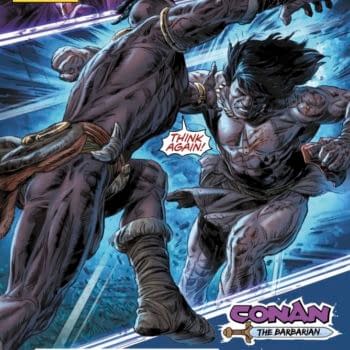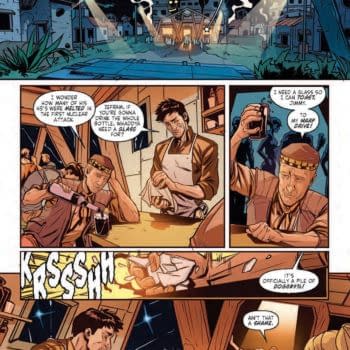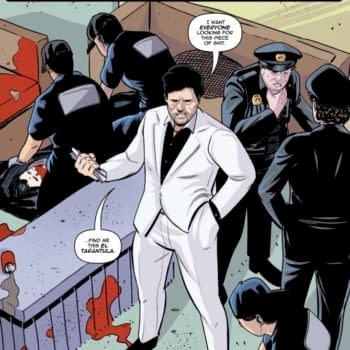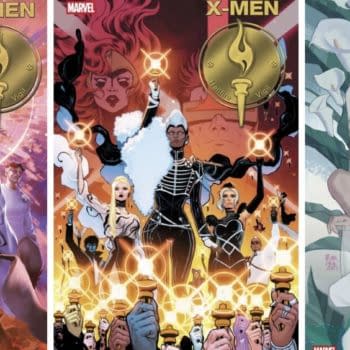Posted in: Comics, Review | Tagged: andy macdonald, Batman, Clayton Cowles, Comics, dc, hi fi, HRL, jla, justice league of america, LGBTQ, reviews, sjw, social justice warriors, steve orlando, the ray
Justice League of America #10 Review: The Social Justice League
Justice League of America #10 is probably more important than people realise. Not because it contains the next step in the Rebirth mystery, or because ties into summer event Dark Nights: Metal, or because it has a major character death or resurrection. No, JLA #10 is important because it tells a story that reflects the times we live in, and has an important message about it.
And before someone complains about comics on a soapbox, JLA is far from that. JLA is fun, enjoyable superhero comics fare, it just happens to have a message of hope, connectedness and power for the people — not over the people — that is deeply relevant right now.

It's a consistent theme throughout the series so far: the super-team not just facing off against gods, pan-reality tyrants, or monsters, but doing so via connecting with the civilians affected by these things.
Justice League of America #10 centres on Vanity, the hometown of JLA member The Ray, where people's wishes are being granted by the mysterious Might Beyond the Mirror, only to then see those wishes being torn away by the equally mysterious Kingbutcher.
All of this, however, is framed around the team's own debate over security and trust. Batman takes the hardline security approach of assuming the worst until proven otherwise, and Ray voices the view that they should allow benefit of the doubt until proven otherwise.

What's particularly great about how Steve Orlando writes these arguments is that he does so with subtlety and class. Neither part or opinion is inherently wrong, but rather differing views. Both arguments have extremes that aren't good or productive. And although Ray gets angry, given they've just gone through a situation where Batman's suspicions were proven correct, the differing opinions never come to blows.
This is important. Anyone who reads the news or keeps up with Twitter — or comment sections on most websites — will be able to see that people now have a tendency to let differences of opinion blow way out of proportion. And this just exacerbates the problems we originally had.
Orlando employs the character of Xenos well here, as he reminds the reader of something that seems lost on many in the world today: empathy. Xenos can see both sides or the argument. He even says he leans more into Batman's side, but he wishes he could be like Ray. Moreover, he tries to explain to Ray to be empathetic toward Batman, as it's clear where his way of thinking comes from.

We then see one of those extremes in action, as the argument is illustrated by the superhero action of the issue. Kingbutcher is removing the granted wishes of the populace of Vanity simply because he and the Lords of Order don't know the reason for their being granted — and they suspect villainy. Kingbutcher himself states that they do not know the Might's intentions, so they will treat as a threat.

The other extreme is mentioned, as Ray points out that they will, of course, investigate the wishes, but they will not assume that they are inherently malicious, nor will they destroy the happiness of people coming from a deeply depressed part of the world.
Similarly, we live in a world where certain leaders would happily see whole groups of people barred from a country based on the actions of a few; and in other parts of the world we tear ourselves apart due to leaders happily using falsehoods and misinformation over the populace for their own personal gain. So to see a team of heroes stand up for the everyman, for the population of a city — and even work with them — is good to see.
In fact, it's important to see. It's important for the audience to see examples of power used responsibly and for the people. These heroes, whilst not "street-level", still stand next to a normal person on the street to do what is right by them, while also allowing them to be part of that decision. It's been refreshing to see decisions not being made by lofty men and women in spandex in the sky, but these figures discussing things with those who would be affected.
With art duties handled by Andy MacDonald and Hi-Fi, it's a lovely looking book, too. It helps that the art is not realistic in style, while the story deals with very realistic arguments, because it helps soften the message without robbing it of its importance — especially given the incredibly capable use of expression throughout.
Overall, Justice League of America #10 is another entry in a series that is presenting us with a very new take on superhero-ing — one that gives everyone a sense of importance. It carries an important message without bashing the reader over the head with it or boiling it down and oversimplifying it into another gratuitous hero vs hero bust-up over a difference of opinion.
















